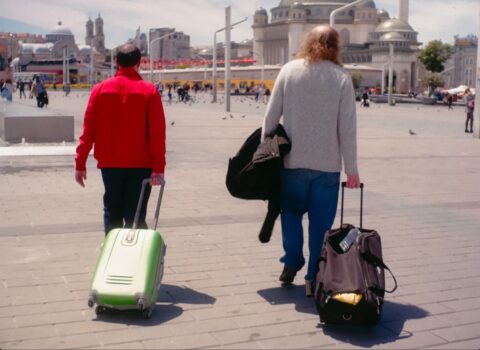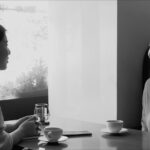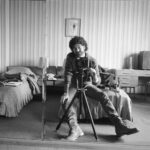There is a lot going on in the slash in Before/After (Manoël Dupont, 2025). This light yet fascinating Belgian film thrives inside liminal spaces, capturing a sense of stasis, caught between ideas, possibilities, lives. It’s arthouse purgatory, comprised of a series of illusory, contradictory fragments, rich in meaning and impossible to pin down. Inside that “/“ is a whole, restless, foreign world, as vast as the Bosphorus, straddling not only continents, but perhaps entire universes of personal experience and intention.
At least that’s what I think Dupont, in his debut feature, charting the travails of two newfound friends travelling to Istanbul to restore their balding hair, is trying to convey. This is a strange and elusive hybrid work, one that grasps for meaning in its own making, rather than with a clear idea of what it wants to say. This gives it an improvisatory, fly-on-the-wall quality, even if it makes its final conclusions rather unclear and obtuse. I mostly liked it, even if it’s a film difficult to love.
It starts with two men meeting in a car, their interaction almost immediately taking on odd and romantic overtones. Jérémy (Jérémy Lamblot) is a hitchhiker; Baptise (Baptise Leclere) is dropping him off at his dark, dank, deserted house. Jérémy invites Baptise inside, and the two men bond over the fact that they are slowly balding. Soon, they are both in Istanbul, shopping around for the best hair transplant that money can buy.
Both Lamblot and Leclere are playing versions of themselves, two men who were going to travel to Istanbul for hair transplants anyway before agreeing to be in this fictional film. The facilities themselves also appear to be legit, with real staff performing a real surgery, filmed like a documentary.
It’s also fortuitously shot exactly during the period between the first and second round of voting during Turkey’s 2023 election, giving the entire setting an unreal, politically-charged quality; the country’s stasis and sad inability to move past Recep Tayyip Erdoğan strangely mirrored by these men paying to reclaim their fulsome past.
The relationship is particularly interesting. Jérémy, having come into money, is paying for the entire surgery, suggesting that he and Baptise are together, yet, while there is some intimacy, the elliptical editing and passive-aggressive conversations suggest that this relationship could fall apart at any moment, giving the film a brittle, fragile quality. Yet at the same time, their dynamic doesn’t feel particularly compelling either, the amateurish acting making it hard to be invested in either man as an individual.
A further haphazard feel comes from the difficulty of the edit, with Dupont claiming to have compressed the final product from over 30 hours of footage. It gives the impression that he wanted to film a hair transplant and the experience of two men, but instead of shooting a simple documentary, he reaches towards profundity and transience through fiction; a valiant effort, but a non-fiction portrayal may have been the more touching one.
Redmond is the editor-in-chief of Journey Into Cinema.





